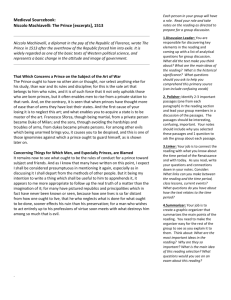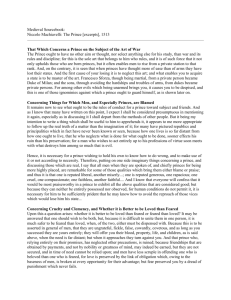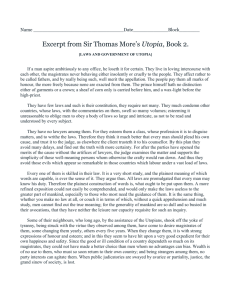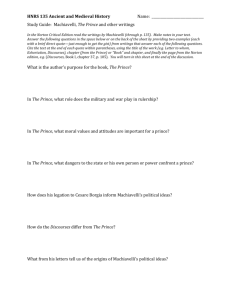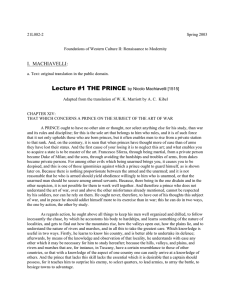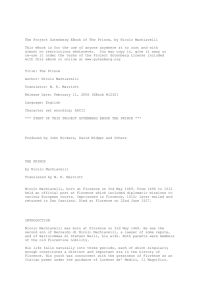Machiavelli
advertisement
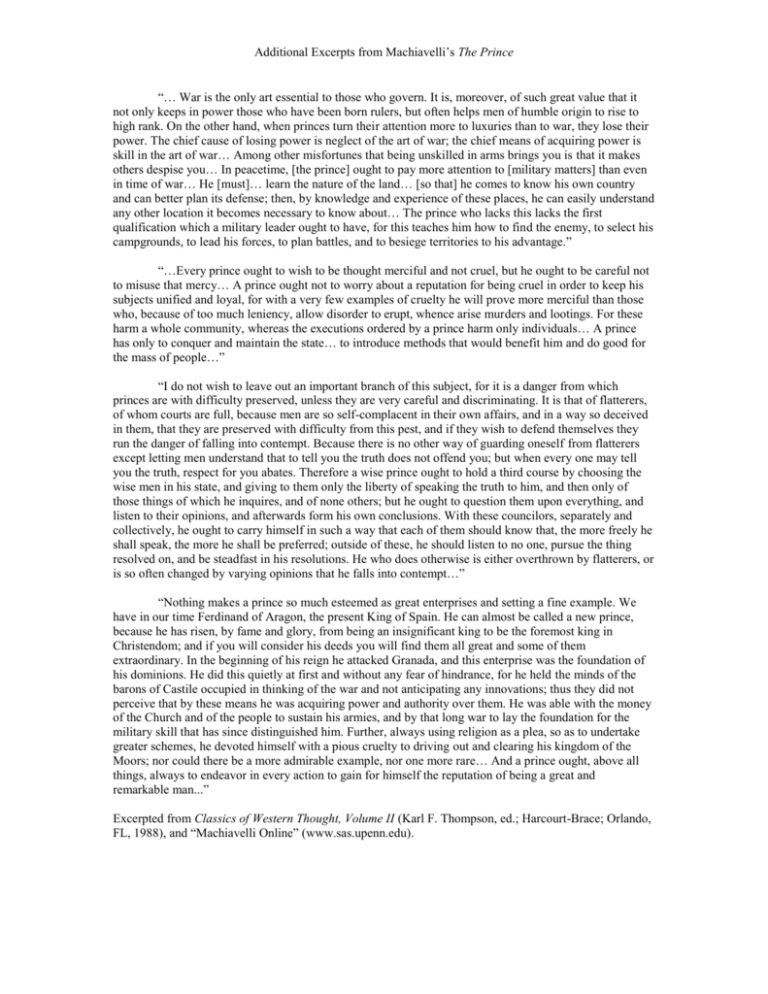
Additional Excerpts from Machiavelli’s The Prince “… War is the only art essential to those who govern. It is, moreover, of such great value that it not only keeps in power those who have been born rulers, but often helps men of humble origin to rise to high rank. On the other hand, when princes turn their attention more to luxuries than to war, they lose their power. The chief cause of losing power is neglect of the art of war; the chief means of acquiring power is skill in the art of war… Among other misfortunes that being unskilled in arms brings you is that it makes others despise you… In peacetime, [the prince] ought to pay more attention to [military matters] than even in time of war… He [must]… learn the nature of the land… [so that] he comes to know his own country and can better plan its defense; then, by knowledge and experience of these places, he can easily understand any other location it becomes necessary to know about… The prince who lacks this lacks the first qualification which a military leader ought to have, for this teaches him how to find the enemy, to select his campgrounds, to lead his forces, to plan battles, and to besiege territories to his advantage.” “…Every prince ought to wish to be thought merciful and not cruel, but he ought to be careful not to misuse that mercy… A prince ought not to worry about a reputation for being cruel in order to keep his subjects unified and loyal, for with a very few examples of cruelty he will prove more merciful than those who, because of too much leniency, allow disorder to erupt, whence arise murders and lootings. For these harm a whole community, whereas the executions ordered by a prince harm only individuals… A prince has only to conquer and maintain the state… to introduce methods that would benefit him and do good for the mass of people…” “I do not wish to leave out an important branch of this subject, for it is a danger from which princes are with difficulty preserved, unless they are very careful and discriminating. It is that of flatterers, of whom courts are full, because men are so self-complacent in their own affairs, and in a way so deceived in them, that they are preserved with difficulty from this pest, and if they wish to defend themselves they run the danger of falling into contempt. Because there is no other way of guarding oneself from flatterers except letting men understand that to tell you the truth does not offend you; but when every one may tell you the truth, respect for you abates. Therefore a wise prince ought to hold a third course by choosing the wise men in his state, and giving to them only the liberty of speaking the truth to him, and then only of those things of which he inquires, and of none others; but he ought to question them upon everything, and listen to their opinions, and afterwards form his own conclusions. With these councilors, separately and collectively, he ought to carry himself in such a way that each of them should know that, the more freely he shall speak, the more he shall be preferred; outside of these, he should listen to no one, pursue the thing resolved on, and be steadfast in his resolutions. He who does otherwise is either overthrown by flatterers, or is so often changed by varying opinions that he falls into contempt…” “Nothing makes a prince so much esteemed as great enterprises and setting a fine example. We have in our time Ferdinand of Aragon, the present King of Spain. He can almost be called a new prince, because he has risen, by fame and glory, from being an insignificant king to be the foremost king in Christendom; and if you will consider his deeds you will find them all great and some of them extraordinary. In the beginning of his reign he attacked Granada, and this enterprise was the foundation of his dominions. He did this quietly at first and without any fear of hindrance, for he held the minds of the barons of Castile occupied in thinking of the war and not anticipating any innovations; thus they did not perceive that by these means he was acquiring power and authority over them. He was able with the money of the Church and of the people to sustain his armies, and by that long war to lay the foundation for the military skill that has since distinguished him. Further, always using religion as a plea, so as to undertake greater schemes, he devoted himself with a pious cruelty to driving out and clearing his kingdom of the Moors; nor could there be a more admirable example, nor one more rare… And a prince ought, above all things, always to endeavor in every action to gain for himself the reputation of being a great and remarkable man...” Excerpted from Classics of Western Thought, Volume II (Karl F. Thompson, ed.; Harcourt-Brace; Orlando, FL, 1988), and “Machiavelli Online” (www.sas.upenn.edu).



